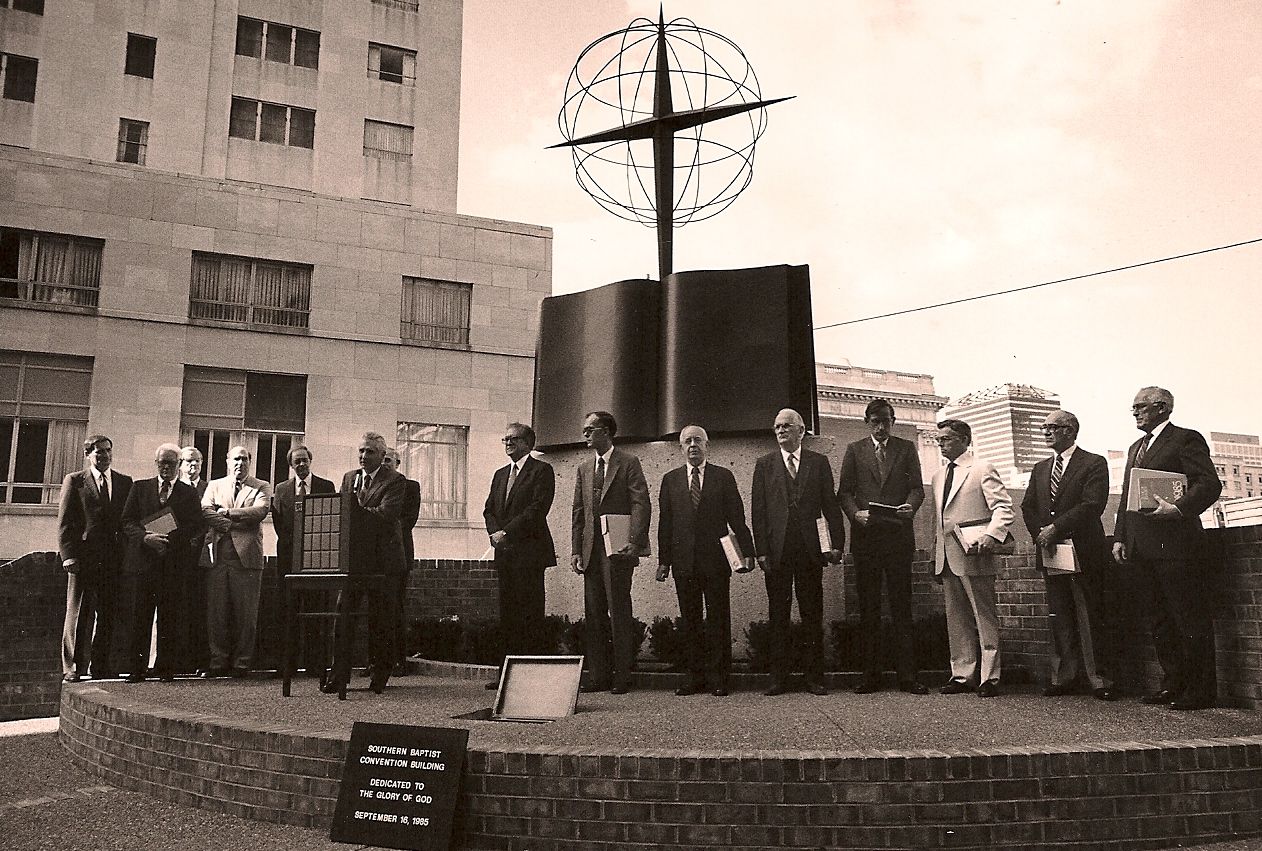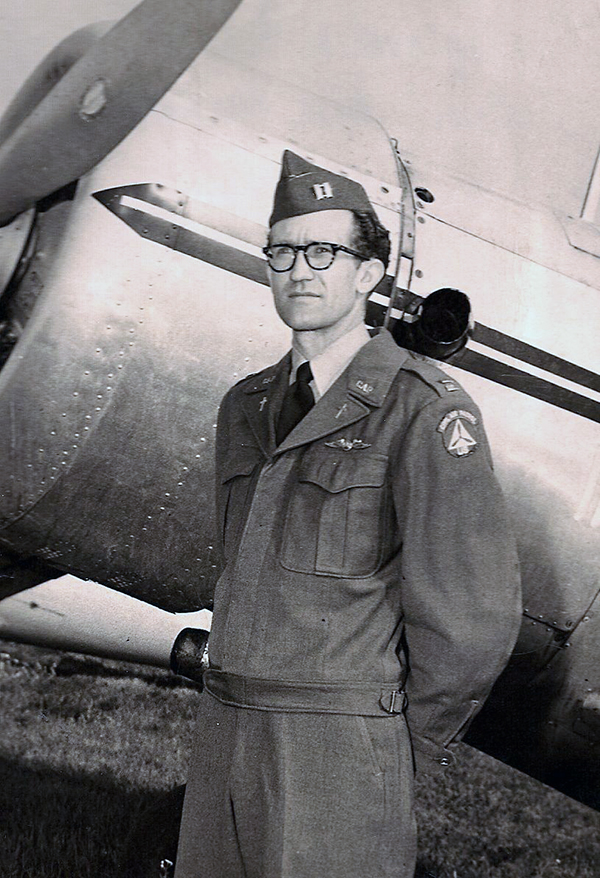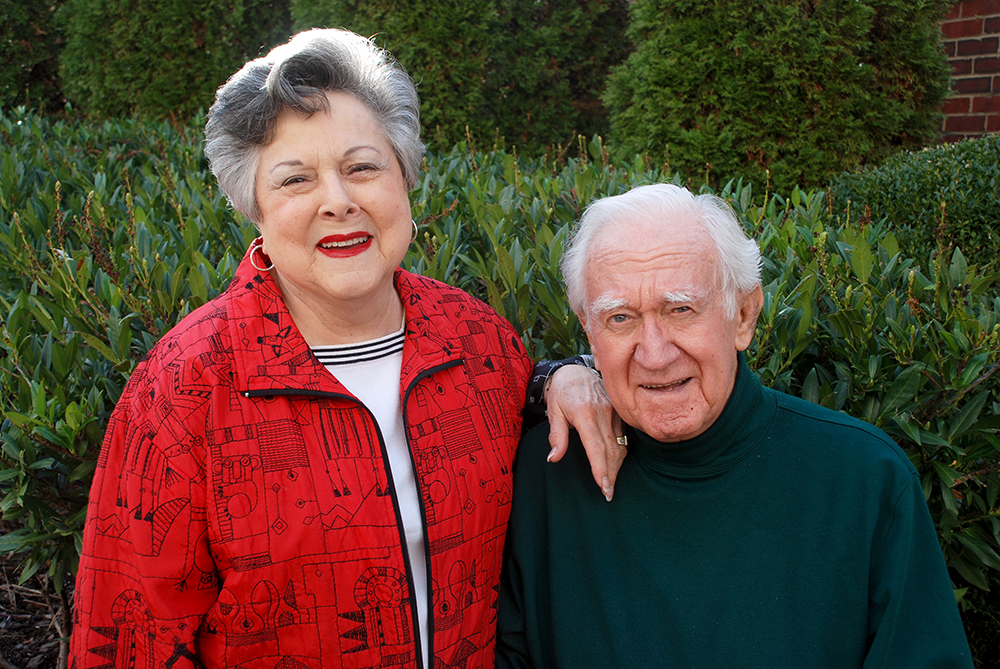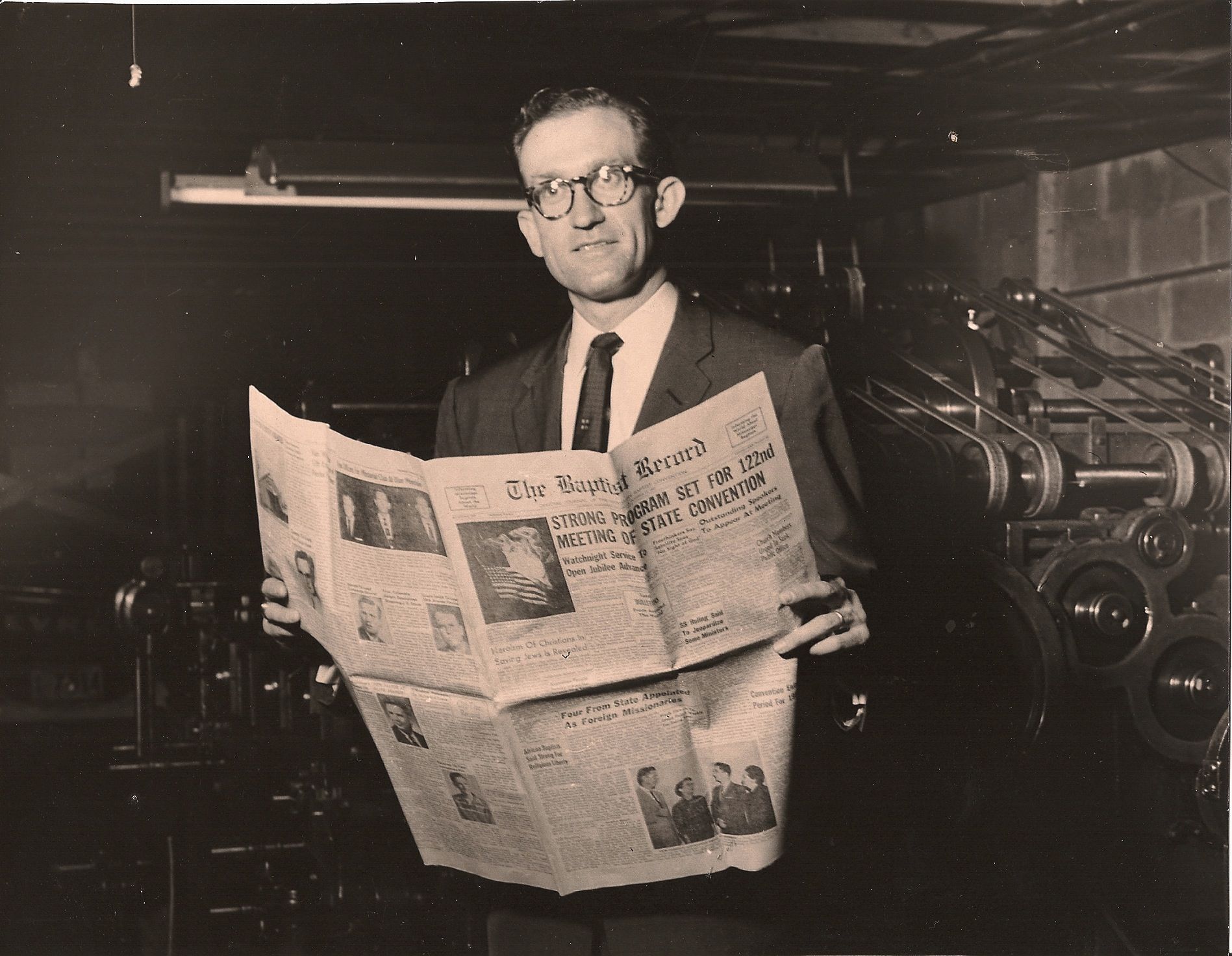Editor’s Note: As a follow-up to our news story about the death of W.C. Fields on Dec. 2, we are republishing this 2015 profile of Fields’ life and career. He was the chief public relations officer and director of Baptist Press for the Southern Baptist Convention’s executive committee, 1959-1987.
The sandpaper of time has smoothed the roughest edges of memory for one of Baptists’ most remarkable characters.
Wilmer Clemont Fields — W.C. to everyone, friend or foe — handled public relations for the Southern Baptist Convention’s Executive Committee during the convulsive years when competing factions were yanking the structure like hungry cousins pulling on a Thanksgiving turkey bone.
Fields’ job was to help religious and secular press understand what the conflict was about when to anyone not embroiled in the fine points of theological-political debate there was not a hair’s width of difference between the two sides.
Rumblings of disunity in the SBC dated to the 1960s. They grew louder, leading to a climactic election of the first conservative leader in Adrian Rogers in 1979 and peaking in 1984 when it became apparent that the conservatives were holding sway. As they gained control of the governance mechanisms of the convention and purged people who disagreed, Fields tried to keep Baptist news outlets informed, explain the situation to national press, retain trust of convention leadership, and earn the confidence of the newly empowered conservatives.
“Our role is to help these folks do a good job,” Fields, 92, says of the press during a December interview in Nashville, Tenn., where he has lived since he began working at the Executive Committee in 1959. “We have to be honest, transparent, trustworthy. Maybe that includes telling them some things Baptists wouldn’t want them to know, but they depend on their sources shooting straight with them.
“That can get you in trouble.”
 And get into trouble Fields did. As vice president for public relations, Fields led the denominational news service, Baptist Press. His philosophy was that the best public relations is a straight-up news service that covers the denomination, warts and all. Such honesty earns credibility in the press, and can merit gentler treatment in the tough times.
And get into trouble Fields did. As vice president for public relations, Fields led the denominational news service, Baptist Press. His philosophy was that the best public relations is a straight-up news service that covers the denomination, warts and all. Such honesty earns credibility in the press, and can merit gentler treatment in the tough times.
“For the most part Baptists appreciated that,” Fields says. As did the press.
After a particularly frank presentation at a national meeting of religion news writers, Associated Press religion writer George Cornell urged his colleagues to “be careful with W.C. here. He’s helping us.”
“They felt protective,” Fields says. “They knew I was going out on a limb. Folks in the news media were trustworthy friends.”
That transparency earned Fields and Southern Baptists some leeway when new leaders did not understand the national weight their new offices gave their words. The relationship was sorely tested when Oklahoma preacher Bailey Smith, for example, declared, “God does not hear the prayers of a Jew.” Or when Tennessee pastor Adrian Rogers declared that seminary professors ought to teach what the majority of Southern Baptists happen to believe — even, he said half-jokingly, if that belief would be so extreme as to say “pickles have souls.”
After Smith’s comments raced across the globe, W.C. fielded a call from Israel’s leading English-language newspaper, Haaretz. Fields assured the paper, and both the Arab and Jewish mayors of Jerusalem, that Smith “doesn’t speak for Southern Baptists, period. He’s way on the right wing of Southern Baptists.”
Then he provided contact information for “true theological authorities” who could explain what Smith was trying so inelegantly to say.
Internally, the rising influence of those leading what establishment leaders called “the takeover” caused Fields fits. Paul Pressler, a Texas judge who came up with the strategy of pulling out all the stops to win the SBC presidency to gain its appointive powers, pushed Fields the hardest.
Although three decades of perspective has cooled the fire of resentment and frustration Fields felt during the controversy, his disdain for Pressler still flows lava hot.
Pressler rode roughshod over Southern Baptists and “gave me thunder,” Fields says. At the time Baptist Press was distributed via snail mail daily, primarily to secular and religion outlets nationwide. For a small fee, individuals could receive the daily mailings.
Pressler “would mark up Baptist Press releases, edit them, and send them back to me to straighten up our act. He read ‘liberalism’ in every story.”
The controversy was costly in human terms. Fields remembers with distaste treatment of professors at Southern Baptist Theological Seminary, from which he earned both master’s and doctor’s degrees and for which he served as national alumni president.
“They were strong minded, great professors,” he says. “If people couldn’t understand what they were saying or teaching, people assumed it was subversive. But they were people for whom I had great respect and appreciation.”
Fields recognizes the decades of controversy were not unique to Southern Baptists. “Most every group, the Episcopal Church, Lutherans in Missouri and Wisconsin synods, had some people like that, too, people who just wanted to … straighten everybody out.”
“The news business can be a very dangerous business,” Fields says. “You’re out there, way out on a limb, every time you put out a press release. But it’s a great business and I loved it from start to finish. I never expected to do that. I expected to be a pastor all my life.”
W
ell, at least from age 15.
Fields was born in a log cabin in the sand hills of Bienville Parish in central Louisiana. He moved to family land in nearby Gibsland while a toddler. His father was one of 10 siblings, among whom were two preachers and a minister of music. Fields had 23 first cousins, all with families, and they, along with strong Baptist and Methodist churches and a vibrant local Boy Scout troop, created a nurturing environment to hear both the call of God and the whisper of his great-grandmother when she said, “I hope God calls you to preach.”
His relatives populated the countryside around Old Saline Church, founded in 1826. The church’s first pastor, George Washington Baines, was president of Baylor University from 1861 to 1863 and was the great-grand- father of U.S. President Lyndon Baines Johnson. Fields’ father, Felder, was agricultural agent for the L&NW Railroad, organizing shipments of raw materials for farmers and carrying their products to market.
On May 23, 1934, when he was 12 years old, Fields witnessed an event that has stocked his story quiver for dinner table conversation for 80 years. Standing at the school water fountain he saw a tow truck pulling a bullet-riddled car stop across the street.
Curious, he walked over, climbed onto the running board and looked inside to see the bloodied bodies of bank robbing legends Bonnie Parker and Clyde Barrow. He remembers the half-eaten sandwich and magazine on Bonnie’s lap and the trunk full of weapons that went untouched when they were ambushed just outside of town.
Called by God to ministry at age 15, Fields began leading music in rural church revivals. Always interested in journalism — because it was a field in which “you asked questions and got answers” — he edited the school newspaper at Baptist-affiliated Louisiana College.
 He also learned to fly and discovered what would become one of his life’s two favorite pursuits, the other being photography. The Air Force set up the Civil Pilot Training Program to uncover potential pilots during World War II.
He also learned to fly and discovered what would become one of his life’s two favorite pursuits, the other being photography. The Air Force set up the Civil Pilot Training Program to uncover potential pilots during World War II.
By age 18 and into his second year at Louisiana College, Fields was pastor of Woodworth Baptist Church, forever grateful for a congregation that “took pride in helping a young guy know what it was all about.”
Each Sunday night the treasurer, one of his two deacons, would hand him an envelope with $10 in it and say, “’The workman is worthy of his hire.’ I thought, that’s about what I was worth. I was so green.”
He ripened fast enough to become pastor simultaneously of two churches near Shreveport before he left for seminary.
“They really took me under their arm and helped me out immensely,” he says. “Members farmed the rich delta and sent their kids to Ivy League schools. They sent me off to seminary in a generous way.”
While Fields’ preacher-boy peers typically went to New Orleans Seminary after college, the influence of Baptist giant Herschel Hobbs directed Fields to Southern Baptist Theological Seminary in Louisville, Ky. In his first week on campus he was called to lead music at Carlisle Avenue Baptist Church, a congregation of 2,000. He later also assumed the duties of minister of education — this while in his first semester of seminary.
 He thrived in seminary and while there met his wife, Libby, a student at Georgetown College. They were married 56 years and had three children before she died in 2002. For the past 11 years, he has been married to Lawanna McIver, widow of Bruce McIver, who for 30 years was pastor of Wilshire Baptist Church in Dallas.
He thrived in seminary and while there met his wife, Libby, a student at Georgetown College. They were married 56 years and had three children before she died in 2002. For the past 11 years, he has been married to Lawanna McIver, widow of Bruce McIver, who for 30 years was pastor of Wilshire Baptist Church in Dallas.
After five years at Carlisle Avenue, with a master’s degree in his pocket, Fields moved across town as pastor of Bethany Baptist Church. Three years and a Ph.D. later a determined search committee from First Baptist Church in Yazoo City, Miss., sprinkled themselves throughout the congregation on the first Sunday of January and claimed a pastor.
W.C. was a fit in Mississippi. Among his members were the “best layman” he ever knew, Owen Cooper, and Cooper’s top fertilizer salesman, Jerry Clower, who spun his tales of life with Earline on Easy Street into a national comedy career. Yet Clower stayed grounded enough to take his Thompson Chain Reference Bible in hand to witness to Saturday shoppers in Yazoo City.
Fields found great enjoyment in — of all things — putting out the church paper. The little paper was of such quality that when the editorship of the Mississippi Baptist newspaper, the Baptist Record, came open, his fellow board members turned to him. He at first declined because, he told them, “I’d have to put up with you birds.”
 “I discovered the Synoptic Gospels are really journalism reports and the book of John is an editorial,” Fields says. “More and more I got to see that this was a call to the ministry. I loved it.”
“I discovered the Synoptic Gospels are really journalism reports and the book of John is an editorial,” Fields says. “More and more I got to see that this was a call to the ministry. I loved it.”
Three years later, in 1959, SBC Executive Committee Executive Secretary Porter Routh, himself a former editor of the Oklahoma Baptist Messenger, asked W.C. to come to Nashville and take over the SBC’s public relations efforts. He stayed until 1987.
“I was surprised when they came to me. I was so deeply imbedded in Mississippi life as the editor. I preached somewhere every weekend and I just enjoyed it immensely.
“It was a tough time. The White Citizens Council was running rampant in Mississippi and they gave me all kinds of headaches. If you just hinted at some kind of integration there were some people who would want to hang you.”
Fields actually was told by a lay leader at a Baptist church in Jackson that he’d rather see his son dead than to see him as an integrationist. “That demonstrates the mindset of the time,” Fields says.
In Nashville Fields established a public relations office that exhibited transparency and straight shooting. That policy was lauded until controversy seeped into convention life and suddenly words shot straight were dissected, parsed and assigned meanings not intended. (Full disclosure: This writer was on the Baptist Press staff from 1977 to 1982.)
Fields built relationships with the major publications covering religion. He helped Baptist state newspaper editors expand their worldview by arranging trips to media centers in Chicago and New York and to the Middle East, often leveraging his connections to gain sponsorships by governments and special fares on airlines. Baptist journalists met heads of state on those trips to discuss religious freedom. They also met and encouraged Baptist missionaries working in those countries.
His office became a vocal supporter of professional development groups such as the Baptist Communicators Association, the Public Relations Society of America and the Religious Public Relations Society.
Fields was a star of the office break room at lunch, captivating young staffers with stories of his worldwide travels and adventures. His story repertoire grew each week and he always had a humorous anecdote to tell his appreciative audience.
Remembering any number of acquaintances from his career, Fields generously applies the appellation “He’s a good one,” or “She’s a good one.” That compliment is so readily applied it would seem Fields knew no adversary.
F
rom humble beginnings, endowed with leadership qualities from an early age, thrust into national controversy, responsible for balancing theological-political nuances within the nation’s second largest denominational body, Fields somehow navigated those waters with aplomb.
What special traits enabled him to traverse that wide divide?
“We’re all products of heredity and environment. I was born into a family of deep devotion, good people, active in church and community life. That was my second nature. I take no credit for all that. I inherited it. The little town where I grew up was a good town. It had a good strong Baptist church and Methodist church, good teachers, an outstanding Scout troop, and was very progressive for the era. Louisiana College provided good influences. Herschel Hobbs was vastly influential, steering me to Southern Seminary instead of New Orleans.
“I was surprised the Lord called me at such a young age. I’m even more surprised that he found me way out there in the sand hills of Louisiana.”
Fields, whose mother, Eva Mae, lived to 103, has been retired from the Executive Committee for as long as he worked there. Time grants perspective, and Fields’ view is that the controversy of his era “forced Southern Baptists to think through who we are. It caused a lot of debate, some of which was constructive and had constructive results. But it was a very painful way to do it.”
Under assault, denominational leaders naturally assumed a defensive posture. In hindsight, Fields admits a more positive tack might have encouraged open dialogue, instead of relationships that became quickly adversarial.
“Things could have been done that were not clear when you’re faced with immediate crises,” he says. “Things had to be done, choices had to be made and we did not always make the right one. You try to do the best you can on your watch and hopefully pass on the work to somebody who will do better.”
Would you do anything over?
“All of it, every last bit of it,” he says with enthusiasm. “Though, no question about it, it could all be improved.”
